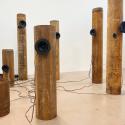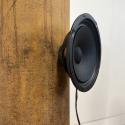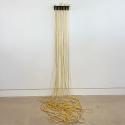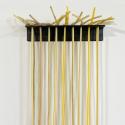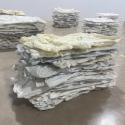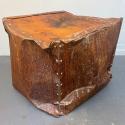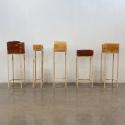Biography
Amanda Cornish’s work operates at the intersection of spatial theory and material culture, examining how our physical environments shape us. Through an embracement of brokenness, she creates still spaces for regeneration and repair.
Working across sculpture, installation, drawing, sound, and text, Cornish sees her works as a collaboration with found objects. Her process begins with the spontaneous encounter, where found items from industrial, domestic, or natural environments act not as passive elements but as agents to provoke a creative dialogue. Through these interactions, she searches for the essence of being, where weathered materials in a state of decay or flux offer paths towards potentiality and stillness. Reoccurring motifs, such as the cylinder or cube, serve as metaphors for the body, while the interior space is seen not as a place of emptiness but of engagement, where the internal world of thought and emotion are inseparable from the external forces of society, nature, and time.
Cornish’s ongoing interest lies with the experience of sculpture; choosing to leave her work open and ambiguous, she focuses on its responsive power. Exploring the space sculpture occupies, where the gap within and between holds the same value as the form itself.
Amanda Cornish is a London-based multidisciplinary artist who graduated with a MA Sculpture (2024) from the Royal College of Art, where she also completed the Graduate Diploma Fine Art programme (2022-23). Prior, she studied at Chelsea School of Art (1985-87). She has exhibited internationally in group shows, including in London, Hong Kong, Tokyo, and New York. She has had solo exhibitions at Mumford Fine Art (London, 2006) and The China Club (Hong Kong, 1994), and has been the recipient of several awards, including the Gilbert Bayes Award (2025) from The Royal Society of Sculptors, the DRAW19 Monochrome Prize (2019), the NOA Heart of England Award (2016), and the RSMA Charles Pears Award (1996).

